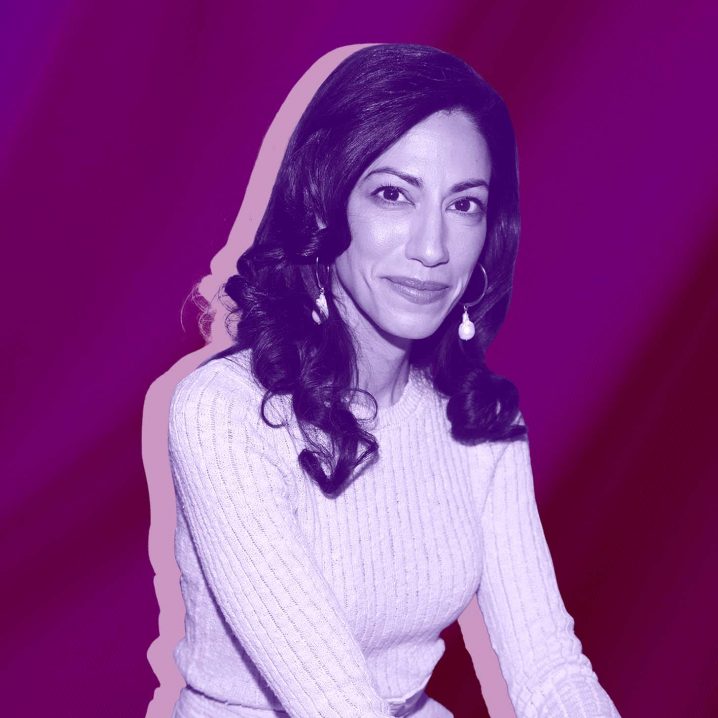
- POPSUGAR Australia
- Celebrity
- Huma Abedin: “For Women, There's a Fine Line Between Looking Competent and Tough”
Huma Abedin: “For Women, There's a Fine Line Between Looking Competent and Tough”

Huma Abedin is chief of staff for Hillary Clinton. Born in the United States and raised in Saudi Arabia, she has spent the entirety of her career in politics and public service. Her memoir, “Both/And,” reflects on her political career and personal life, including her days on Clinton’s presidential campaigns and her marriage to former NY Rep. Anthony Weiner.
In “Both/And,” I write about the night in 2011 Anthony admitted to me that he – and not a hacker – had tweeted an inappropriate picture from his account: “I was simultaneously filled with rage and stunned to my core. It felt like a bolt of lightning had struck me and run straight through my body. That bolt was the only thing keeping me standing upright.”
I was angry on behalf of my child, I was angry on behalf of his constituents, and anger 100 percent got me through those first few weeks. Anger helped propel me forward, but it wasn’t healthy for me to stay angry for good. Having all kinds of emotions – a range of emotions – is healthy. But you can’t dwell on any one feeling. I think of early in my relationship with Anthony – it was such an intense, emotional time. And that state of being is not a state that you can sustain for the rest of your life.
With men, we see anger as a sign of strength. And with women, it’s a tightrope they’re walking on.
What has consistently sparked my rage or anger over the course of my life, whether professional or personal, is when I’ve felt we had such an opportunity to do something big. We had such a responsibility, given these roles we had in our life, and we failed. How could we throw it away? Certainly, that was the case with my marriage. Anthony and I were two public servants doing what I thought was very important work every day. And to throw it away for something so frivolous, something I couldn’t even understand, certainly perpetuated a lot of that rage.
It was ironic that I married Anthony. He was a star in the Democratic Party when I met him, and so much of what broke through about Anthony was his anger. He would have these angry speeches from the floor of the House of Representatives, just outraged about a bill that he thought was not in the best interests of his constituents. And people rewarded that anger. Fast-forward to Donald Trump. With men, we see anger as a sign of strength. It’s a tightrope we’re walking on. And we are nowhere close to figuring it out. Just look at the coverage Vice President Harris gets every day. It drives me insane what she has to put up with, and certainly what Hillary had to put up with.
People accused Hillary of sounding angry and looking angry for her entire career. For women, there’s a fine line between looking competent and tough; it was a challenge we knew we had from day one, when she ran for president in 2007. We had research showing that it was hard for Americans to see a woman as an executive or commander-in-chief. We knew it – we just didn’t know how to deal with it. There’s a story I share in the book about a man who was a communications expert during Hillary’s presidential run in 2016. “She always looks angry when she’s giving a speech, pushing her fist in the air and gesticulating so wildly,” he said. “So maybe what you should do is put a picture of her grandchild on the podium, so she’ll look down and she’ll see something that makes her happy, and as a result she will be happy. And so she will just not look so angry.” That was the sort of thing that really grated on me.
I think maybe it was hard for me to reconcile being a victim in my adulthood because I was so used to being angry on behalf of other people.
I’ve done a little bit of self-analysis about it, and I think maybe it was hard for me to reconcile being a victim in my adulthood because I was so used to being angry on behalf of other people. I remember one of my earliest experiences of rage was when I was a teenager, maybe 13 or 14 years old. I had a friend who came over to our house and did not want to be picked up and taken home at the end of the night. She asked if she could spend the night. Sleepovers, when I was growing up – at least in the environment I grew up in – were not a very common thing. She confided that her father hit her. She rolled up her sleeve, showed us bruises on her arms, and said, “Please don’t send me back.” I think that was the first time I remember feeling real rage. And certainly I had to feel angry on behalf of other people in the Senate and in the White House. People would call and say they needed help, and helping them was our job.
I think the reason my book has broken through the way it has is that, for so long, women saw me as a model of someone who just kind of took it – whatever it was – and tolerated it. I didn’t ever believe I was the story, or should be the story, and I was more than happy to be the support behind the primary people. At 46, I’m finally saying that’s not enough anymore. It is important for me to own my own story. This sort of apologetic approach to how so many of us operate in the world? I’m not that person anymore. Now, I’m navigating my own way and my own space.
– As told to Lindsay Miller


